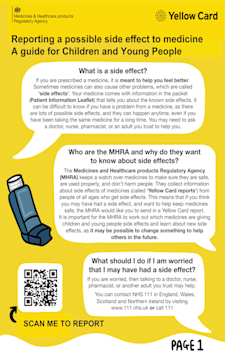Reporting a possible side effect to a medicine – a guide for Children and Young People
Reporting a possible side effect to a medicine – a guide for Children and Young People
Download and print our special leaflet 'Reporting a possible side effect to a medicine – a guide for Children and Young People'.

The guide was tested with over 3,500 children and young people. Please download, print and share it, even on social media. It will help other children and young people learn why it's important to report possible side effects - it helps keep medicines safe and don’t harm others.
What is a side effect?
If you are prescribed a medicine, it is meant to help you feel better. Sometimes medicines can also cause other problems, which are called ‘side effects’. Your medicine comes with information in the packet (Patient Information Leaflet) that tells you about the known side effects. It can be difficult to know if you have a problem from a medicine, as there are lots of possible side effects, and they can happen anytime, even if you have been taking the same medicine for a long time. You may need to ask a doctor, nurse, pharmacist, or an adult you trust to help you.
Who are the MHRA and why do they want to know about side effects?
The Medicines and Healthcare products Regulatory Agency (MHRA) keeps a watch over medicines to make sure they are safe, are used properly, and don’t harm people. They collect information about side effects of medicines (called ‘Yellow Card reports’) from people of all ages who get side effects. This means that if you think you may have had a side effect, and want to help keep medicines safe, the MHRA would like you to send in a Yellow Card report. It is important for the MHRA to work out which medicines are giving children and young people side effects and learn about new side effects, as it may be possible to change something to help others in the future.
What should I do if I am worried that I may have had a side effect?
If you are worried, then talking to a doctor, nurse, pharmacist, or another adult you trust, may help. You can:
Contact NHS 111 in England and Scotland on 111 (textphone 18001 111)
NHS Direct Wales/Galw IECHYD Cymru on 0845 46 47 (textphone 0845 606 46 47)
What side effects can be reported on a Yellow Card?
You can report any side effect you think you may have had on a Yellow Card even if taking multiple medicines or with food/drink. The side effect you are worried about may not be on the leaflet (Patient Information Leaflet) that comes with the medicine, that is ok, it might be a new effect and you can still report. You can also report any problems from any medicine, vaccine, fake products, e-cigarettes or vapes, as well as from a medical device. Some examples of medical devices are: an inhaler used for asthma, hearing aids, devices for checking blood sugar levels or insulin pump for diabetes, or EpiPens for allergies, some medical devices also include apps and software that are to help measure or calculate medical problems).
When should I report the side effect?
You can report a side effect anytime, even if you are no longer using the medicine. The medicine may have come from a doctor, pharmacy, or a shop, it doesn’t matter, all can be reported. If you take more than one medicine, and are not sure which one caused the side effect, you can put the names of all the medicines on the report.
How do I report the side effect?
You can fill out a Yellow Card report in different ways:
Using a computer or smart phone (with permission), go to www.mhra.gov.uk/yellowcard
Using the Yellow card app on a mobile phone or tablet.
You can ask a doctor, nurse, pharmacist, or adult you trust to complete a Yellow Card with you.
The MHRA may need to ask some more questions about your side effect, so they will need a way of contacting you or an adult you trust if you give their details. The MHRA will not share your personal information, or those of your trusted adult, with anyone else.
References
Bhoombla N, Preston J, Ainsworth J, Bird H, Jadeja M, King C, Hawcutt DB. Pharmacovigilance Reports Received from Children and Young People, and Development of Information to Aid Future Reporting from this Age Group. Paediatr Drugs. 2020 Jun;22(3):335-341. doi: 10.1007/s40272-020-00391-6. PMID: 32253722
Hawcutt DB, Jadeja M, Bhoombla N, Smith S, McWilliam SJ. Information for children and young people about reporting suspected adverse drug reactions. Arch Dis Child. 2022 Jul;107(7):681-685. doi: 10.1136/archdischild-2021-323400. Epub 2022 Mar 15. PMID: 35292430
Bioletti L, Alder Hey Research Ambassadors, Woodward C, Jadeja M, Hawcutt DB. Assessing and further developing age-appropriate information for young people about reporting suspected adverse drug reactions.
Br J Clin Pharmacol. 2024; 90(3): 863-870. doi: 10.1111/bcp.15971
See our MHRA press release.